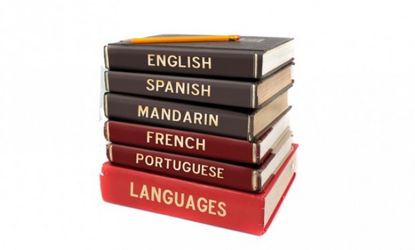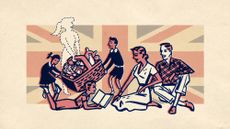How many languages is it possible to know?
It depends on whom you ask



There are millions of people, even in the mostly monolingual U.S., who speak more than one language at home. Competence in three languages is not unusual, and we've all heard stories of grandmas and grandpas who had to master four or five languages on their way from the old country to the new. In India it is common for people to go about their business every day using five or six different languages. But what about 10, 20, 30, 100 languages? What's the upper limit on the number of languages a person can know?
In his book Babel No More, Michael Erard travels around the world in search of hyperpolyglots, people who study and learn large numbers of languages. Here, a look at some of the hyperpolyglots he met:
Graham Cansdale, 14 languages
Subscribe to The Week
Escape your echo chamber. Get the facts behind the news, plus analysis from multiple perspectives.

Sign up for The Week's Free Newsletters
From our morning news briefing to a weekly Good News Newsletter, get the best of The Week delivered directly to your inbox.
From our morning news briefing to a weekly Good News Newsletter, get the best of The Week delivered directly to your inbox.
Cansdale uses all 14 languages professionally as a translator at the European Commission in Brussels. He has studied more languages.
Lomb Kató, 16 languages
This Hungarian polyglot said five of these "lived inside" her. Five others needed at least a half day of review in order to be reactivated, and with the six remaining she could do translation. Confidence, she claimed, was crucial to language learning. Her study tip: "Be firmly convinced you are a linguistic genius."
Alexander Arguelles, about 20 languages
Sign up for Today's Best Articles in your inbox
A free daily email with the biggest news stories of the day – and the best features from TheWeek.com
Arguelles declines to say the exact number. "If someone tells you how many languages they speak, then you shouldn't trust them," he says. He has studied more than 60 languages and devotes nine hours of study every day to them. Twenty is the number of them in which he has reading competence.
Johan Vandewalle, 22 languages
In 1987, Vandewalle won the Polyglot of Flanders contest, where he was tested in 22 languages (though he has studied more). The contest required 10-minute conversations with native speakers, with five-minute breaks in between.
Ken Hale, 50 languages
The famous MIT linguist said he could "speak" only three languages (English, Spanish, Walpiri), and could merely "talk" in others. He considered the ability to speak a language to include knowing all its cultural implications. He didn't like people perpetuating the "myth" of his language feats, though many colleagues had observed him do things like study a grammar of Finnish on an airplane and start speaking it easily upon arrival.
Emil Krebs, 32 to 68 languages
The number depends on who's counting. A German diplomat who worked in China, Krebs had such an unusual talent for languages that after his death his brain was preserved for study.
Cardinal Giuseppe Mezzofanti, 40 to 72 languages
One of his biographers broke it down as follows: He had 14 that he had studied but not used, 11 in which he could have a conversation, nine which he spoke not quite perfectly but with a perfect accent, and 30 languages (from 11 different language families) which he had totally mastered. Stories of Mezzofanti's language prowess are so legendary, they may be merely legends.
It is clear from Erard's time among the hyperpolyglots that with the right kind of natural talent, motivation, and hard work, remarkable feats can be accomplished. The psycholinguists Erard talked to said there was "no theoretical limit to the number of languages one could learn." There was only the limitation of time.
But most of the hyperpolygots themselves were reluctant to claim too many, even when they had studied dozens. This is because they have a finer definition of "knowing" a language than most people, and the humility that comes from becoming an expert: The more you know, the more you know what you don't know. Among the hyperpolyglots, 15 seems to be about the high end when it comes to the number of languages they are willing to vouch for in themselves. Even so, the 30 or so other languages with which they may have some lesser familiarity are probably still better than your high school Spanish.
More from Mental Floss...
* When did Americans lose their British accents?
Create an account with the same email registered to your subscription to unlock access.
Arika Okrent is editor-at-large at TheWeek.com and a frequent contributor to Mental Floss. She is the author of In the Land of Invented Languages, a history of the attempt to build a better language. She holds a doctorate in linguistics and a first-level certification in Klingon. Follow her on Twitter.
-
 Why au pairs might become a thing of the past
Why au pairs might become a thing of the pastUnder The Radar Brexit and wage ruling are threatening the 'mutually beneficial arrangement'
By Chas Newkey-Burden, The Week UK Published
-
 'A direct, protracted war with Israel is not something Iran is equipped to fight'
'A direct, protracted war with Israel is not something Iran is equipped to fight'Instant Opinion Opinion, comment and editorials of the day
By Harold Maass, The Week US Published
-
 Today's political cartoons - April 17, 2024
Today's political cartoons - April 17, 2024Cartoons Wednesday's cartoons - political anxiety, jury sorting hat, and more
By The Week US Published